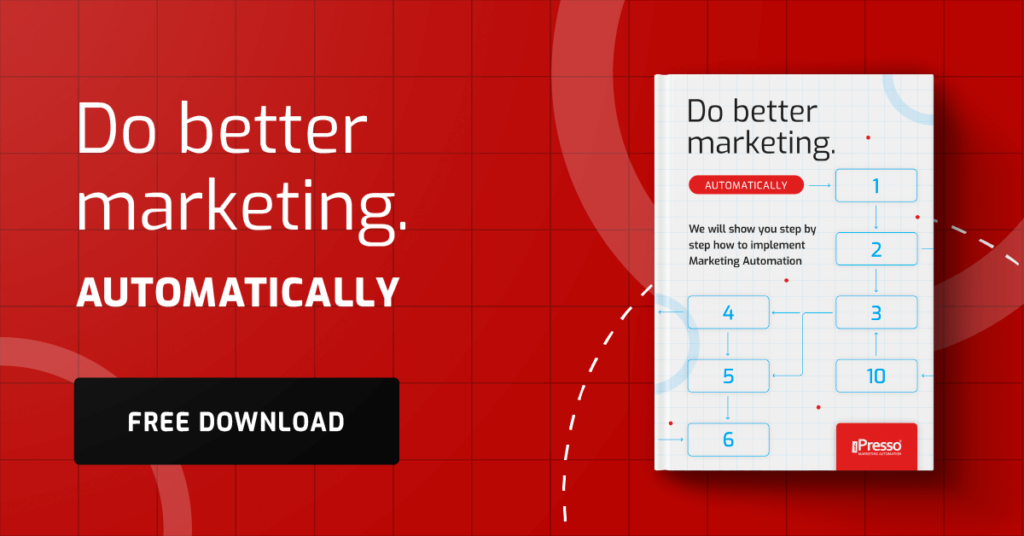Time management in Marketing Automation: Automation of routine tasks

In today’s dynamic world, where competition is constantly increasing, time management has become a key element of success. Particularly in marketing, where the speed of response and effectiveness of actions are of great importance, effective use of time becomes a priority. In this situation, Marketing Automation, i.e. the automation of marketing processes, becomes an indispensable tool supporting time and resource management.
What is Marketing Automation?
Marketing Automation is a strategy that is based on the use of tools, technologies and IT platforms to automate marketing processes, increase the effectiveness of activities and improve relationships with customers. This is an area that has been developing dynamically for over a dozen years, responding to the growing market requirements and the needs of companies in terms of time and resource optimization.
The history of Marketing Automation dates back to the 1990s, when the first attempts to automate marketing processes appeared. Initially, it was mainly limited to simple solutions, such as programs for sending mass emails. However, the real development of this area occurred with the development of the Internet, mobile technologies and analytical tools in the first decade of the 21st century.
The year 1992 is considered the beginning of Marketing Automation, when Digital Equipment Corporation (DEC) introduced the first customer relationship management (CRM) tool. Although initially CRM focused mainly on collecting customer data, it was the foundation for the later development of Marketing Automation.
In the following years, with the development of the Internet, the first platforms for automating marketing processes were created, such as Eloqua (founded in 1999) and Marketo (founded in 2006). These platforms enabled, among others: automatic sending of emails, tracking user behavior on websites and customer segmentation.
With the development of technology and the increase in competition on the market, Marketing Automation has become more and more advanced and comprehensive. Currently, advanced platforms are available that offer a wide range of functions, such as personalization of communication, automatic creation of reports, lead scoring and integration with other business systems.
Marketing Automation has become an integral element of the marketing strategies of many companies, both small and medium-sized enterprises and large corporations. Optimizing time and resources, improving the efficiency of operations and better understanding customer needs are the main benefits of using Marketing Automation in business practice.
Using Marketing Automation to manage time
Marketing Automation is an extremely important tool for modern marketing departments, which enables the automation of many routine tasks that consume valuable employee time. For example, the process of sending welcome emails can be optimized by using Marketing Automation. Instead of manually sending each new subscriber a welcome email, you can set up an automatic system that will send such an email immediately after a person signs up for your mailing list. This not only saves time, but also ensures consistency and timeliness in communication with customers.
Similarly, personalized offers can be generated automatically based on customer behavior and preferences. For example, if a customer visited a specific product page on your website, you could automatically send them an email with a promotion for that product. Such action not only increases the chance of the customer’s interest in the offer, but also uses information about his behavior for marketing purposes.
Another example is automatic reminders of abandoned carts on the store’s website. Instead of waiting for manual employee interventions, the Marketing Automation system can automatically send an email reminder about an unfinished purchase, which can increase conversions and store revenues.
All these examples show how Marketing Automation can be used to eliminate routine tasks that consume marketing employees’ time. Thanks to this, human resources can be directed to more strategic activities, such as data analysis, strategy planning or creating innovative marketing campaigns. This allows companies not only to save time, but also to achieve better business results through more efficient use of resources and a better understanding of customer needs.
Advantages of automating routine tasks
Save time. When marketers don’t have to spend time manually completing repetitive tasks, they can focus on strategic initiatives, data analysis, and creating more effective campaigns. For example, instead of spending hours manually collecting data and preparing reports, they can use available tools to automate data analysis. Thanks to this, they can more quickly identify trends, customer preferences and areas for optimization. This, in turn, will allow them to tailor their marketing strategies to real customer needs, increasing campaign effectiveness and generating better business results.
By automating routine tasks, marketers can devote more time to creative content creation processes. Instead of manually sending mass emails or preparing standard content for various communication channels, they can focus on developing personalized and attractive materials that will attract attention and engage customers. For example, they can create interactive content that encourages audiences to actively participate in the campaign, which increases customer engagement and loyalty.
Additionally, eliminating manual, repetitive tasks allows marketers to be more flexible and respond faster to changing market conditions. Thanks to this, they can quickly adapt to new trends, respond to customer behavior and take appropriate actions before the competition does. This, in turn, can bring the company a competitive advantage and better business results in the market.
Better efficiency. Automation of marketing processes enables faster response to customer behavior and a more personalized approach, which significantly increases the effectiveness of marketing activities. With access to real-time data on customer behavior, marketers can immediately respond to signals about customer activity and adapt communications and offers to their needs and preferences.
For example, if a customer visits a website and browses products from a given category, the automation system can automatically send him a personalized offer about the products that interest him. Such immediate response can result in higher customer engagement and an increased chance of making a purchase.
Automation also enables customer segmentation into more precise groups based on their behavior, preferences and purchase history. Thanks to this, marketers can create more personalized and targeted campaigns that reach directly to specific target groups, instead of using a one-dimensional approach for the entire customer base. Personalization of communication increases customer engagement, builds a bond with the brand and leads to greater effectiveness of marketing activities.
Automation allows you to constantly monitor the effectiveness of your marketing activities and quickly adapt your strategy if necessary. Thanks to advanced analytical tools, marketers can track campaign results in real time, identify areas for optimization and quickly take corrective actions. This allows for continuous improvement of marketing activities and maximization of return on investment.
Automation of marketing processes is becoming not only a tool for saving time and resources, but also a key element in building more effective and personalized relationships with customers and increasing the effectiveness of marketing activities.
Scalability. Thanks to automation, it is possible to serve a larger number of customers and potential customers without the need to increase human resources. Traditionally, servicing each customer required people to be involved in the process, which limited the company’s scalability and ability to serve more customers. However, thanks to Marketing Automation tools, many tasks can be performed automatically, which allows companies to serve a larger volume of customers with minimal involvement of human resources.
Automating the email sending process allows a company to reach a large number of customers at once, without having to manually send each message. The system can be configured to send personalized emails based on customer behavior and preferences, allowing for effective communication with each customer.
Automating the advertising campaign management process allows the company to effectively reach more potential customers on various advertising platforms, such as Facebook, Instagram or Google Ads. Using advanced targeting tools and automatic campaign optimization, the company can achieve greater visibility and increase the number of conversions without increasing human resources.
Automation of marketing processes enables the company to effectively manage customer relationships on a larger scale. Thanks to CRM (Customer Relationship Management) and Marketing Automation systems, the company can track customer interactions, manage them and deliver personalized communication on a large scale, which contributes to building lasting customer relationships and increasing brand loyalty.
Automation of marketing processes allows the company to serve a larger number of customers and potential customers without the need to increase human resources, which translates into increased operational efficiency and improved business results.
Precise performance tracking. Most Marketing Automation platforms offer advanced data analysis tools, which allows you to accurately track the effectiveness of your activities and quickly respond to changing trends. These analytical tools are a key element in the process of improving marketing strategies and optimizing operations.
Thanks to advanced data analysis functions, marketers can accurately track customer behavior at various stages of the purchasing path. They can collect information about customers’ interactions with marketing content, their reactions to promotional offers, or even their purchase history. This data allows marketers to better understand customer preferences and needs and adapt their activities accordingly.
Additionally, data analysis tools in Marketing Automation platforms enable marketers to monitor the effectiveness of individual campaigns and marketing activities. They can track key performance indicators such as email open rates, click rates, and conversions. Thanks to this, marketers can quickly identify which campaigns are the most effective and which require optimization.
Advanced data analysis tools allow you to generate detailed reports and analyzes that help you make strategic marketing decisions. Marketers can analyze trends, identify customer behavior patterns, and predict future market trends. This allows you to quickly respond to changing market conditions and adapt marketing strategies in real time.
Advanced data analysis tools in Marketing Automation platforms are an essential tool for every company that wants to effectively manage its marketing activities. They allow marketers to accurately track the effectiveness of their activities, quickly respond to changing trends and constantly improve marketing strategies, which translates into achieving better business results.
Increasing customer engagement. By personalizing communications and better understanding customer needs, automation can lead to greater customer engagement and loyalty. Personalization is a key element of building strong customer relationships and creating a positive user experience.
Automation of marketing processes allows companies to personalize communication at various stages of interaction with the customer. For example, based on data about customer behavior, such as purchasing preferences, product browsing history or website activity, the company can provide personalized content and offers that are more attractive and relevant to each customer.
Personalized communication makes customers feel more noticed and appreciated by the company, which leads to greater engagement. Customers are more likely to respond to communications that reflect their individual needs and preferences, which in turn can help increase conversions and generate more revenue for the company.
Personalizing communication can also influence the building of an emotional bond between the customer and the brand. When customers receive content that is tailored to their personal preferences and needs, they experience greater engagement and greater brand loyalty. This emotional engagement can lead to long-term customer loyalty and increased customer lifetime value to the company.
Automation of marketing processes allows companies not only to achieve greater effectiveness of marketing activities, but also to build lasting relationships with customers through personalized communication and better understanding of their needs and preferences. This, in turn, can help increase customer engagement and loyalty and generate more revenue for the company.
Summary
Time management in today’s business world is becoming more and more demanding, especially in the area of marketing. Therefore, Marketing Automation becomes an indispensable tool for every company that wants to use its time and resources effectively. Automating routine tasks not only saves valuable time, but also increases the effectiveness of marketing activities and improves customer relationships. Implementing Marketing Automation requires proper planning and commitment, but it can bring significant benefits in the form of better business results and greater market competitiveness.



